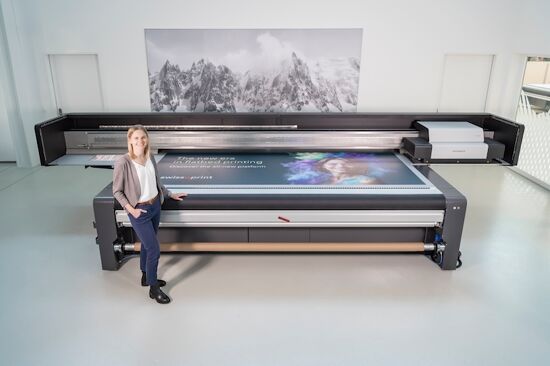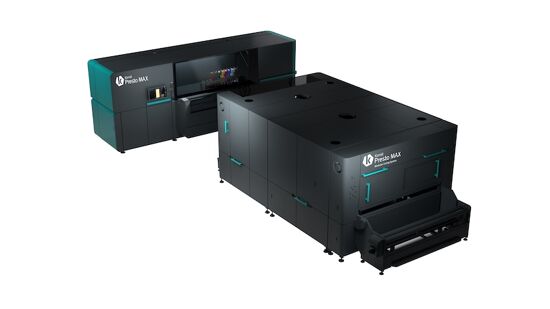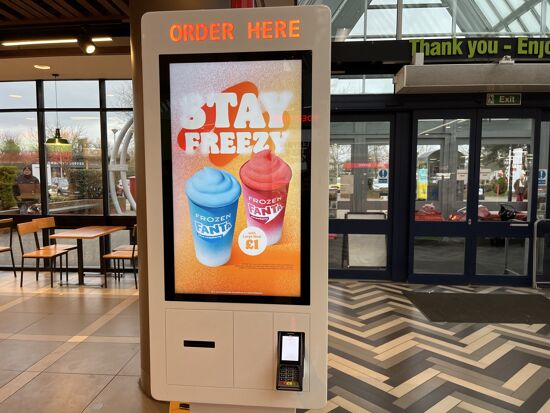How to use software to redefine manufacturing in the ecommerce supply chain

Debbie McKeegan speaks to Henrik Muller Hansen, founder of Gelato, where they discuss the pivotal role of software in redefining the manufacturing and fulfilment processes within the ecommerce supply chain.
Gelato was founded by CEO, Henrik Müller-Hansen, in 2007 and consists of the Gelato platform and the consumer brand Optimalprint. Headquartered in Oslo, Norway, the company has offices in Atlanta, Barcelona, Berlin, Boston, Denver, Kyiv, Lahore, London, Madrid, Mumbai, Nashville, Singapore, Stockholm, and Tallinn.
CAPTION: “The future of e-commerce and personalised product production hinges on the effectiveness of advanced software solutions such as Gelato.” Image Credit: FESPA
Now operating in over 32 countries, Gelato has revolutionised how businesses and individuals approach printed products and their design, sale, and fulfilment. To give an indication of scale, in 2023 more than 25,000 new ecommerce players placed orders through their platform, and using Gelato Connect, millions of orders were fulfilled and delivered to end-customers in 184 countries. In 2022, more than 85% of Gelato’s orders were produced in the same country as the end-customer.
By leveraging a global network of print partners, Gelato empowers users to access high-quality, localised printing services. In rewiring traditional buying behaviours, they enable reduced shipping times and costs and organically minimise each and every products’ environmental impact. Gelato's innovative platform seamlessly integrates with various e-commerce platforms, streamlining the process from order placement to order fulfilment.
Innovations in the Printing Industry underpin Product Personalisation:
Henrik explained how the continual advancement of digital technology has revolutionised the printing industry in multiple ways. "Not only have these technological improvements led to faster production speeds, but they have also significantly increased the overall efficiency of digital printing processes. These changes mean that digital printing is now more reliable and cost-effective than ever before, allowing for larger volumes of high-quality prints to be produced in shorter timeframes".
Furthermore, Henrik pointed out that the integration of cutting-edge software and automated systems has streamlined operations, reducing the margin for error, and enhancing the precision of printed materials. "This progress is not only beneficial for large-scale industrial printing but also for smaller businesses that can now access high-quality printing solutions at a lower cost".
In addition, recent innovations and technical advancements have opened up new possibilities for customisation and personalisation in print, catering to the increasing demand (globally) for tailor-made products. The ability to produce unique, customised prints quickly and efficiently is a testament to the significant strides the industry has made.
Overall, Henrik's insights underline a transformative period in the printing industry, driven by continuous technological advancements that promise to keep pushing the boundaries of what's possible in the years to come.
The Benefits of Decentralisation and Localisation:
Henrik highlighted why decentralising and localising production is key in today's global market. "When we decentralise production, we cut down on shipping times and costs, which is great for the environment and means faster deliveries for our customers," he said. Decentralisation involves distributing the production process across multiple locations, while localisation means producing goods closer to the end consumer. Gelato Connects software works smoothly with local print hubs, making sure products are made closer to where they're needed. This approach has also slashed carbon emissions from long-distance transport.
 CAPTION: “As the demand for personalised products spikes, it puts pressure on local producers to innovate and meet these specific consumer needs efficiently.” Image Credit: Gelato
CAPTION: “As the demand for personalised products spikes, it puts pressure on local producers to innovate and meet these specific consumer needs efficiently.” Image Credit: Gelato
The Critical Role of Automation for Efficiency:
Highlighting the critical role of automation in enhancing efficiency within the digital printing industry Henrik stated, "Automation is the backbone of digital manufacturing, by automating repetitive tasks and workflows, we can free up human resources to focus on more strategic and creative initiatives. Gelato Connect leverages advanced algorithms to automate order processing, print queue management, and inventory control. This automation not only reduces human error but also speeds up the entire production process, making it more reliable and cost-effective”.
"Today's consumers expect seamless transactions and rapid turnaround times," he noted. Gelato Connect integrates effortlessly with major e-commerce platforms, allowing businesses to offer personalised printed products without the typical logistical challenges. "This integration is a game-changer, as it bridges the gap between online retail and on-demand manufacturing," Henrik added. Through such integration, businesses can quickly adapt to market trends and customer preferences, ultimately driving higher satisfaction and loyalty.
Data-Driven Decision Making
"Data is the new oil, and harnessing it effectively can dramatically improve operations," Henrik stated. In providing a seamless architecture between sales and production, the Gelato software provides comprehensive analytics on production efficiency, customer behaviour, and supply chain logistics. These valuable insights enable businesses to make informed decisions, optimise resource allocation, and foresee market demands. "With real-time data at our fingertips, we can respond proactively rather than reactively."
Sustainable Printing Practices Enable Systemic Change
Lastly, Henrik touched upon the growing importance of sustainability in printing. "Sustainability is no longer a choice—it's a necessity," he said. Gelato naturally supports sustainable printing practices by promoting on-demand production, which minimises waste and ends overproduction. The integration of local print hubs also means fewer carbon emissions from transportation. "Our goal is to make sustainable printing the standard, not the exception," Henrik added. By adopting, and enabling eco-friendly practices, Gelato is setting an example for the industry and contributing to a more sustainable future.
In conclusion, the printing industry, across all market sectors and industries is undergoing a seismic transformation - a technical transformation that is driven and supported by advanced software solutions. By decentralising production, enhancing automation, integrating with e-commerce platforms, leveraging data for decision making, and committing to sustainable practices, Gelato is not just meeting the expectations of today's market but shaping the future of the industry.
The fusion of Creativity, Technology and Process is creating unprecedented opportunities and challenging us all to think beyond traditional paradigms. Rewiring all aspects of the value chain is well underway and with visionaries like Henrik Muller Hansen there is no limit...only progress.
Interested in joining our community?
Enquire today about joining your local FESPA Association or FESPA Direct
Recent news

The importance of ink for large format printers
Ink is crucial for large format inkjet printers, influencing substrate compatibility, productivity, and cost. Nessan Cleary discusses the three main types which include UV-curable ink, latex ink and eco-solvent ink. Each ink type has specific strengths and weaknesses, making printers choice dependent on budget and intended applications.

What are the benefits of Direct-To-Fabric printing?
Direct-to-fabric printing is gaining popularity for high-volume textile production, enabling on-demand, customized short runs. These printers offer ink flexibility, accommodating various fabric types like cotton and silk, though ink development focuses on faster turnaround by reducing pre- and post-processing. Compared to traditional methods, direct-to-fabric inkjet printing is a more sustainable option due to reduced water and chemical usage, and localized production.

What are the opportunities for large format providers regarding digital touch screens?
Digital touchscreens are becoming increasingly common, offering businesses opportunities to improve customer engagement and streamline operations. Nessan Cleary shares, while more expensive to implement than standard digital displays due to complex software and integration needs, touchscreens provide self-service options, multilingual support, and can reduce staffing costs in various settings like retail, transportation, and healthcare.
